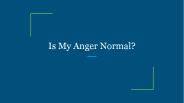Anger Management Therapy In Doral Fl PowerPoint PPT Presentations
All Time
Recommended
When you experience the loss of a loved one, the support of family and friends can help you manage your grief, and even though you might benefit from seeking therapy, you may not choose to do so. Believing that the grieving process is typically a long one, and that it’s normal to experience grief for a prolonged period after a loss, is often the reason why many people don’t seek therapy for their bereavement. However, if you’re struggling to move on through the grieving process, and are finding that your sense of loss has become overwhelming despite support from friends and family, counseling can almost certainly help you, and here’s why:
| PowerPoint PPT presentation | free to download
When you experience the loss of a loved one, the support of family and friends can help you manage your grief, and even though you might benefit from seeking therapy, you may not choose to do so. Believing that the grieving process is typically a long one, and that it’s normal to experience grief for a prolonged period after a loss, is often the reason why many people don’t seek therapy for their bereavement. However, if you’re struggling to move on through the grieving process, and are finding that your sense of loss has become overwhelming despite support from friends and family, counseling can almost certainly help you, and here’s why:
| PowerPoint PPT presentation | free to download
Panic attacks are a common occurrence for many, and involve the individual experiencing a sudden and intense episode of fear with no real cause. In many cases, they can trigger serious physical reactions, such as chest pains, dizziness and nausea. Often happening without warning, the Anxiety and Depression Association of America estimate that as many as 6 million people suffer from panic attacks, with women twice as likely to experience them. For some, self-care steps can help them manage the frequency and intensity of their attacks, while for others, professional help is needed.
| PowerPoint PPT presentation | free to download
If you’re a new mum, you might be wondering why you’re not feeling overjoyed and thankful for the tiny new life you’ve recently been gifted with. Instead, you’re feeling exhausted, down, sad, and filled with intense guilt about your parenting skills, or lack of.
| PowerPoint PPT presentation | free to download
If you’ve been diagnosed with COVID-19, it’s not unlikely that you might feel tired, stressed or even sad as a result, and many people who experience physical symptoms of the virus, screen positive for depression and anxiety. However, it’s important to note that symptoms of COVID-19 are often found to overlap with symptoms of depression, such as disordered sleep patterns, impaired concentration and a reduced appetite.
| PowerPoint PPT presentation | free to download
While anger is a perfectly normal emotion, many of us tend to associate it with frustrated teenagers struggling with their hormones, and fail to recognize the symptoms and triggers, or know when to seek help in dealing with a possible anger disorder.
| PowerPoint PPT presentation | free to download






